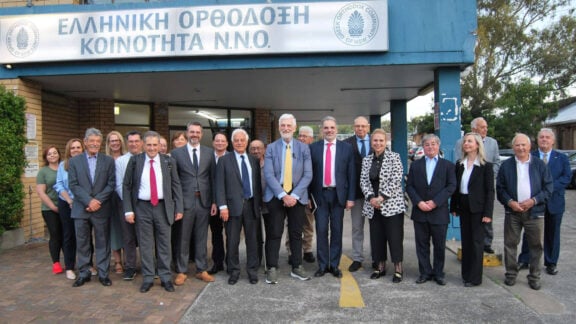The escalating US-China trade war has dealt a heavy blow to Greek-Australian small business owner Sophia Argyropoulos, whose Melbourne-based D cup+ swimwear brand RAQ has been forced to shut down its US sales operations.
RAQ, known for its supportive swimwear tailored for larger busts, had built a loyal customer base in the United States, with 20 per cent of its sales coming from the market. But this month, US President Donald Trump’s tariffs on Chinese-manufactured imports—jumping from 10 per cent in February to a staggering 145 per cent in April—effectively priced her out.
Taking to her brand’s social media, she said it was a “really hard decision to make”.
“When tariffs went over 100 per cent on Chinese made goods, I was like ‘well we literally can’t make any money’,” she said on a video share on TikTok and Instagram.
Argyropoulos who has studied finance and economics made the call to cut off her US sales after understanding that the process would wipe-out her profit. She also did not want her US client to have to shoulder the cost.
Initially, Argyropoulos passed the added cost to customers. When tariffs hit 20 per cent, she absorbed the difference. But when they skyrocketed to 145 per cent, a $95 bikini top suddenly carried an extra $137.75 in fees.
Although RAQ is proudly Australian-owned and operated, with all orders shipped from its Melbourne warehouse, the brand’s manufacturing is based in China. Argyropoulos shared that throughout the years of operating her brand she has not found other manufacturers that can match the expertise of her collaborators in China, not the quality vs cost analogy.
Relocating manufacturing to Australia isn’t viable either. RAQ’s designs require advanced technical sewing skills—more akin to lingerie production than typical swimwear—and those skills simply aren’t widely available locally.
“To manufacture locally, I’d have to invest a fortune into setting up a factory, buying machinery, and training a labour force. That’s not realistic for a small business right now,” she later told 9news.
Furthermore, her long-standing relationship with her Chinese manufacturer is something she’s not keen to sever. “I don’t want to put them out of work either.”
“When we’re sending our products to US customers, we have to declare they’re made in China. If we’re covering that cost, it will wipe all our revenue,” she continued.
“So, it was a no-brainer to turn off the website. I don’t want to put that cost onto our US customers.”
“We lost 20 per cent of our sales overnight,” she said.
However, she noted that the timing couldn’t be worse. With the Australian winter approaching, RAQ typically pivots to the Northern Hemisphere to keep business afloat during the local off-season.
With RAQ’s US-facing marketing cancelled, Sophia hopes to limit the fallout, but the winter slump in sales may have long-term consequences. Argyropoulos is now shifting focus to the UK and other European countries in hopes of breaking into a new market, even though she underscored that “it’s not a revenue one can turn on overning”.
“Feeling for everyone in the US right now, and small brands that are going to lose a lot of business. I assume a lot of other brands are going to stop selling to the US,” she concluded in her video.
Meanwhile, China followed through on its promise and announced late Friday that it would raise tariffs on US goods to 125 per cent.









